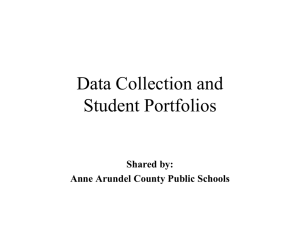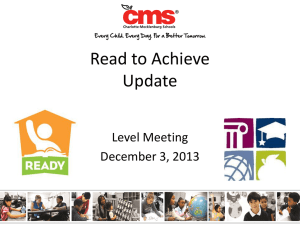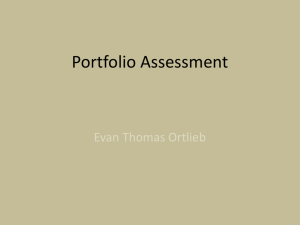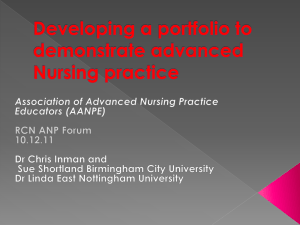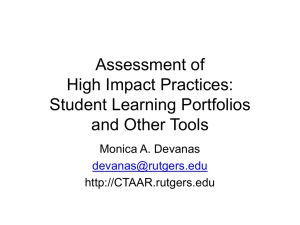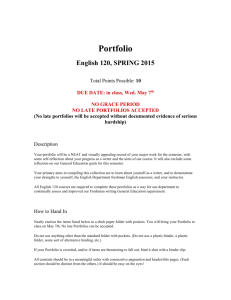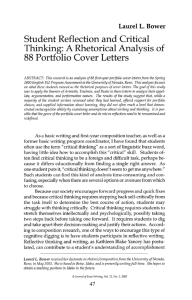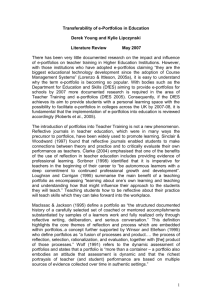Tri-fold Project Leaflet
advertisement
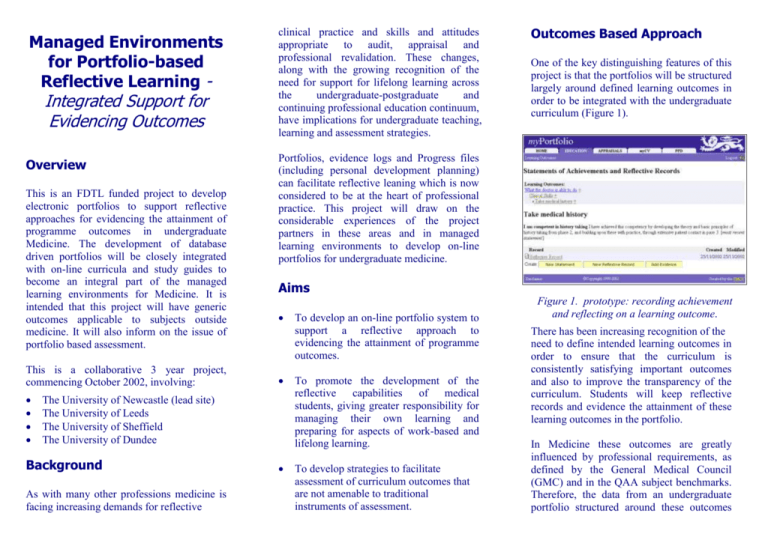
Managed Environments for Portfolio-based Reflective Learning - Integrated Support for Evidencing Outcomes Overview This is an FDTL funded project to develop electronic portfolios to support reflective approaches for evidencing the attainment of programme outcomes in undergraduate Medicine. The development of database driven portfolios will be closely integrated with on-line curricula and study guides to become an integral part of the managed learning environments for Medicine. It is intended that this project will have generic outcomes applicable to subjects outside medicine. It will also inform on the issue of portfolio based assessment. This is a collaborative 3 year project, commencing October 2002, involving: clinical practice and skills and attitudes appropriate to audit, appraisal and professional revalidation. These changes, along with the growing recognition of the need for support for lifelong learning across the undergraduate-postgraduate and continuing professional education continuum, have implications for undergraduate teaching, learning and assessment strategies. As with many other professions medicine is facing increasing demands for reflective One of the key distinguishing features of this project is that the portfolios will be structured largely around defined learning outcomes in order to be integrated with the undergraduate curriculum (Figure 1). Portfolios, evidence logs and Progress files (including personal development planning) can facilitate reflective leaning which is now considered to be at the heart of professional practice. This project will draw on the considerable experiences of the project partners in these areas and in managed learning environments to develop on-line portfolios for undergraduate medicine. Aims The University of Newcastle (lead site) The University of Leeds The University of Sheffield The University of Dundee Background Outcomes Based Approach To develop an on-line portfolio system to support a reflective approach to evidencing the attainment of programme outcomes. To promote the development of the reflective capabilities of medical students, giving greater responsibility for managing their own learning and preparing for aspects of work-based and lifelong learning. To develop strategies to facilitate assessment of curriculum outcomes that are not amenable to traditional instruments of assessment. Figure 1. prototype: recording achievement and reflecting on a learning outcome. There has been increasing recognition of the need to define intended learning outcomes in order to ensure that the curriculum is consistently satisfying important outcomes and also to improve the transparency of the curriculum. Students will keep reflective records and evidence the attainment of these learning outcomes in the portfolio. In Medicine these outcomes are greatly influenced by professional requirements, as defined by the General Medical Council (GMC) and in the QAA subject benchmarks. Therefore, the data from an undergraduate portfolio structured around these outcomes may provide a suitable foundation for a postgraduate portfolio to support continuing professional development (CPD). It is also intended that the Supporting life-long-learning It is one of our aims to use portfolios to promote the development of the reflective capabilities of students, giving greater responsibility for managing their own learning and helping them develop the skills for lifelong learning and CPD. It is also intended that the portfolio will be transportable, for example using emerging interoperability standards for electronic transfer of data to other systems. This will be an important aid to bridging the undergraduate-postgraduate educational continuum. Assessment and Appraisal The portfolio will help students to evidence that they have achieved the curricular outcomes. As well as important clinical knowledge and skills there are also programme outcomes relating to professional attitudes and behaviour. The portfolio may provide a means of assessing these attitudinal outcomes which are not amenable to traditional methods of assessment. There are many challenges and issues relating to portfolio-based assessment and it is intended that this project will inform on these. Recently the GMC has recommended that medical students should receive regular, structured and constructive appraisal. The portfolio may prove to be a means of preparation, reviewing achievements recorded against the curriculum outcomes, documenting appraisal outcomes, and for recording and monitoring agreed action plans. Using Internet Technologies Students have become increasingly familiar with using Web based systems for their curriculum delivery, study guides, assessment, communications, and other aspects of their education. The concept of a managed learning environment aims to draw these components together. Electronic portfolios in which the learner can record, reflect and plan their educational activities will be integrated within the different managed learning environments of the project partners. During the project we will also explore the integration of portfolios with other learning environments, including Blackboard and The Bodington System. Also, as it will be a database-driven system it is intended that the portfolio will be dynamic living document, rather than being simply a static archive of evidence. The ultimate aim of the project is to help develop better doctors who will have the necessary skills for life-long learning and continual professional development. It may also provide a means of satisfying GMC and QAA guidelines. It is intended that the solutions developed will be transferable to subjects other than medicine. Further information: Project web site: http://www.eportfolios.ac.uk Contacts: Dr. Tony McDonald Project Manager / Assistant Director tony.mcdonald@ncl.ac.uk Mr Simon Cotterill Senior Research Associate S.J.Cotterill@ncl.ac.uk -or write to: Using Internet technologies has the advantages of allowing students secure access to their own personalised records from a range of locations. The technology allows the portfolios to be organised in different ways, to be searchable, and to give the user the ability to allow aspects of their records if desired. School of Medical Education Development The Medical School University of Newcastle University of Newcastle 16/17 Framlington Place Newcastle upon Tyne NE2 4AB
